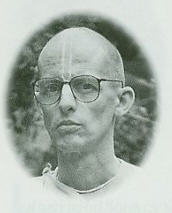
Satsvarupa Dasa Goswami
LAST CHRISTMAS, Life magazine did a cover story entitled "Who is God?" They asked that question of many people and printed the replies. The color photos of worshipers throughout the world showed many ways of approaching God. Life said, "The God of our story is the God of personal, private faith." Intrigued by the topic, I asked myself, "Okay, what's your answer to 'Who is God?'"
My personal faith in God comes from my spiritual master, Srila Prabhupada, and from the Vedic scriptures. The intimations I had of God's presence when I was a child were faint indications only. Real God consciousness began for me when I met Srila Prabhupada and heard about Lord Krsna. It is the Supreme Lord who speaks the Bhagavad-gita whom I wish to serve and love.
God is revealed not only in the Vedic scriptures but in other scriptures of the great world religions. The worshipers appear to have different understandings, yet the expert spiritual master knows that the essence of religion is one love of God. The details differ with the time in which religion is taught, the persons to whom it is taught, and the place where it is taught.
We cannot deny that God comes to people in His own way. One Life testimony was from an old woman who didn't know for sure whether there is a next life or whether there is God. A housemaid from Beirut said that God is a very old black person and He wears a long white robe.
Everyone is entitled to his or her own faith. But there is a science of revelation. God shouldn't be discussed only by hunches. We have a right to our own feelings, but the feelings need to be directed.
I cannot claim to be more directly touched by God than others. But my point is that we should become educated in our God consciousness. We shouldn't deliberately avoid this education, thinking that it's sectarian. And we shouldn't, like some people, take God in a sentimental way and think that sacred books and teachers are useless.
In our relationship with God, the most important relationship of our lives, it is best that we approach reliable sources of study. Srila Prabhupada used to say that religion without philosophy is sentiment or fanaticism, and philosophy without religion is dry speculation. Therefore pure devotees of Krsna are bhaktivedantas: they approach God through devotion (bhakti) as well as through scriptural knowledge and the power of reasoning (vedanta).
Who is God? Only God Himself knows this answer completely, and therefore we should hear from Him. In the Bhagavad-gita and other scriptures, Lord Krsna tells us, "I can be known only by devotional service." Krsna also makes it easy for us to know Him by telling us He can be seen even within the material world. He says, "I am the taste of water, the light of the sun and the moon, the syllable om in the Vedic mantras; I am the sound in ether and the ability in man" (Bhagavad-gita 7.8).
There are symptoms of a person who has realized God. The chief symptom is that he always serves and praises his Supreme Beloved. He cannot bear to be away from Krsna's service for even a moment. When people come in contact with such a pure devotee, they also become attracted to hearing and chanting about the Supreme. And the result of such knowledgeable devotional service is that one can ultimately attain to Sri Krsna's eternal abode.
Frankly, some of the witnessing in Life turned me off. A rancher thinks God is pleased when he kills cows.
A boy from India says, "It would be pretty boring sticking to one God every day…. My dad bought this lottery pen. It shoots out numbers like in the lottery … so when I pray I take a number. Whichever number comes out I pray to that God."
I know that any progress toward God-worship is worthwhile. The Supreme Lord considers all worshipers pious, even when they approach Him for material relief through the demigods. But should we consider all God conscious persons to be on the same level? Krsna says, "As all approach Me I reciprocate. Everyone is on My path." But He also advises that the best devotees are they who approach the Supreme Personality of Godhead not for any profit but just out of love. This topmost way of knowing God is bhakti-yoga. Krsna calls it "the king of all knowledge." And He advises that we eventually give up all lesser forms of religion and "Just surrender to Me."
In former ages, persons determined to know "Who is God?" used to undergo severe austerities to reach the goal. Because the difficult practices of yoga and meditation are mostly no longer possible in the present age, Lord Caitanya has taught us an easy method, one authorized by scriptures: chanting the holy names of God. The holy names are not different from God Himself, so a sincere chanter can make quick advancement in God consciousness.
For the most part I enjoyed reading Life's faithful testimonies. They're certainly more encouraging than statements by nonbelievers. I honor the witnesses. It is an education to meet God-fearing, God-loving persons. And if we can learn to appreciate one another, we can go a long way toward defeating atheism. When devotees of God meet with open minds, I will find that "my" God is not so different from yours.
Satsvarupa Dasa Goswami is the author of more than two dozen books, including a six-volume biography of Srila Prabhupada.
